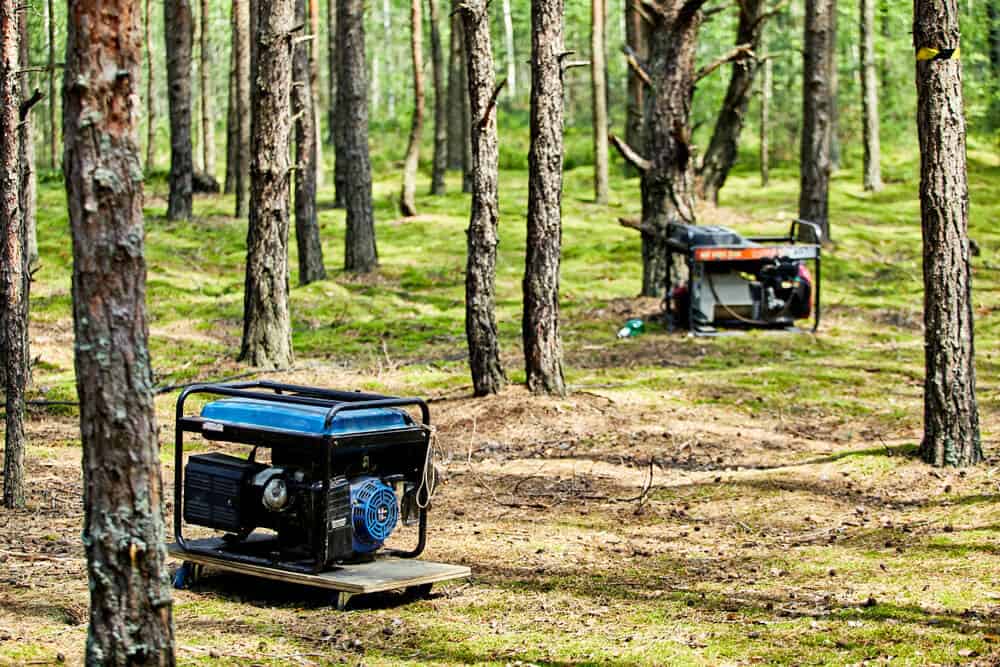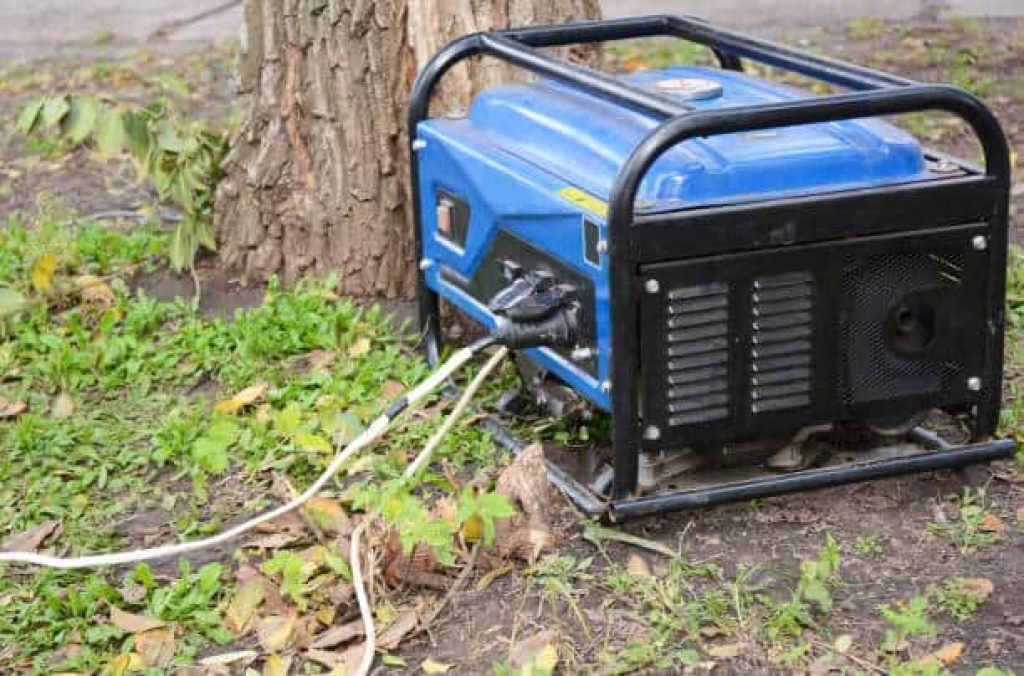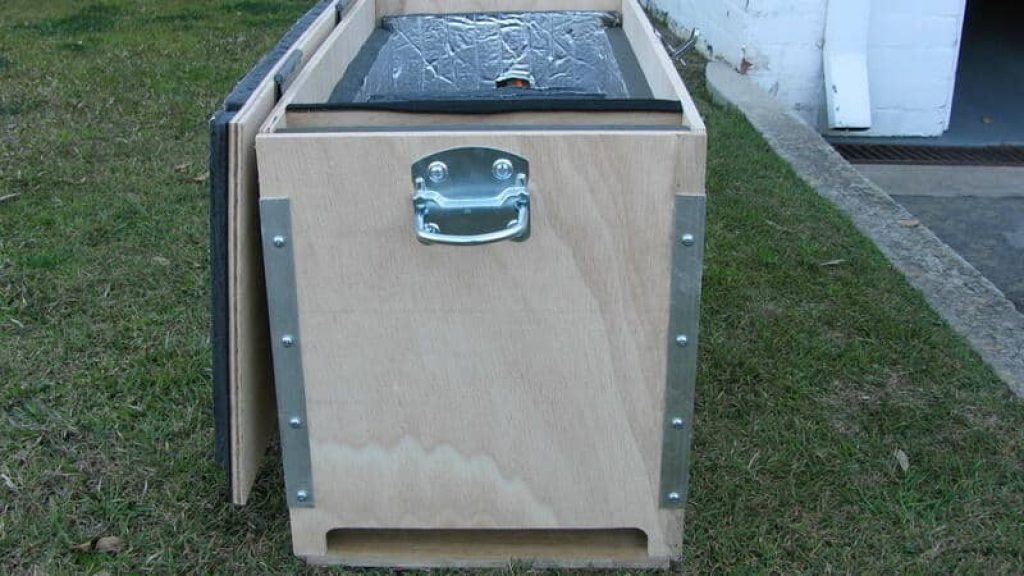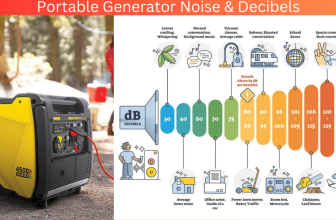
Generators make a lot of unpleasant noise, but it is nothing compared to the benefits they bring to every establishment and household. Generators are important as they supply electrical power and ensure the continuity of your daily activities without a regular power source.

The major downside of having a generator is the loud noise. There are quiet generators available on the market, but if you have the kind that produces too much noise, you need to learn how to quiet a generator.
Here’s how to make a generator quiet:
- Know your power needs
- Point the exhaust pipes in an upward position
- Place the generator at least 20 feet away
- Avoid all hard surfaces
- Add rubber feet to your generator
- Get a non-flammable soundproof blanket
- Use sound deflectors
- Use a baffle box
- Consider replacing the muffler
- Use the water muffler method
- Ask the experts
How To Quiet A Generator
Generators, either small or large, can come in handy while camping out and enjoying the outdoors. If you want to reduce the noise from your generator and have a more peaceful environment, here’s a quick guide on making your generator as quiet as a cricket.
1. Know Your Power Needs
Before you purchase a generator, it is important to determine how much power you need to know what kind of generator to buy. Remember that the more power your generator gives, the more noise it will make.
Aside from learning how to quiet a generator, you need to determine these three basic things:
- the amount of money you are willing to spend on a generator
- the amount of power you need
- the amount of noise you can tolerate
If you want to go on a camping trip, you will only need electricity for your electronics (e.g., phones, tablets) and other essentials. For smaller devices like these, you will do fine with less powerful and smaller generators for electronics. For larger appliances like refrigerators, air conditioning units, and microwaves, you will need a generator with an output of 2,000 to 5,000 watts.
2. Point The Exhaust Pipes In An Upward Position
To avoid the generator’s unpleasant buzz sound, you need to position the exhaust pipes upward.
When you position the exhaust pipes facing up, the noise will also go in that direction, which means there will be less noise directed towards you.
It is a very simple yet very effective way to reduce noise.
3. Place The Generator At Least 20 Feet Away
Another simple way how to quiet a generator is by placing it further away. When camping, the rule of thumb is to place the portable generator at least 20 feet away. The further the generator, the quieter it gets.
How far you will place your generator depends on the camping location. If camping in a smaller campground, you must consider the other campers. You don’t want to bother them with the noise from your generator.
If the campground is bigger and there are fewer people, place your generator further away to reduce the noise. Consider the length of your power cord in determining how far you should place your generator.
4. Avoid All Hard Surfaces
Another thing to consider if you are figuring out how to quiet a generator is the surface or location where you place it while it is running.
A lot of the noise from the generator comes from vibration. It is important to place it on a surface that will amplify the noise.

If you want to dampen the generator noise, avoid all hard surfaces. Also, do not place it on an unstable surface. It will increase the vibration and increase the noise as well.
When outside, you can place the generator on the grass. It will absorb the noise from the rumbling generator. You can also add some rubber pads or mats underneath the generator to reduce the vibration and noise. Carpets and rugs will also work as anti-vibration pads.
5. Add Rubber Feet To Your Generator
Need more tips on how to quiet a generator? There is no doubt that rubber is an amazing sound-absorbing material. Put rubber feet on your generator to minimize the vibration. If you can find rubber feet specifically made to prevent vibration, the better.
It is one of the simplest solutions on how to quiet a generator, and you can match it up with the other methods to make the generator as quiet as possible.
6. Get A Non-Flammable Soundproof Blanket
There are so many ways how to quiet a generator. In your quest to reduce generator noise, do not forget the soundproof blanket.
You can cover your generator with plywood, drywall, and a blanket as long as there is enough ventilation. Sufficient airflow is necessary to avoid overheating. Give the fan and exhaust enough air ventilation, and you will be fine.
When using a non-flammable soundproof blanket to reduce the noise from the generator, make sure to cut some holes for the fan and exhaust. Don’t cover the generator with an overly large blanket. Make sure there is enough gap between the ground and the blanket to deflect the sound effectively.
7. Use Sound Deflectors
The simple question is – what is a sound deflector?
It may sound too technical, but in reality, it is not. Sound deflectors are designed to redirect the noise from the spot you are on. You need to learn its function to know how to quiet a generator.

So, how to quiet a generator using sound deflectors?
It is simple. You will need four sheets of plywood and one sheet of non-flammable drywall. All should be around four feet wide and three feet tall.
You can divert the noise from the generator by placing the pieces up against the generator. Place the plywood at an angle that still leaves some room for airflow. And since you don’t want your deflectors to catch fire, place the drywall on the side that houses the exhaust.
8. Use A Baffle Box
Are you still struggling and learning how to quiet a generator? Well, you should try using a baffle box.
Using a baffle box or an acoustic enclosure is very similar to using sound deflectors. It helps in reducing the noise coming from the generator. The enclosure will contain sound waves and significantly reduce the noise decibels.

Compared to using simple sound deflectors, baffle boxes are more compact. It is very useful for using on your RV generator.
You can purchase a baffle box. But, if you want to make it yourself, you will need a few pieces of 2×4 wood, L-brackets, foam sealer, and quiet board. Do not forget to add some holes in your baffle box for airflow. The heat will damage the generator, so make sure to put holes in the part where the exhaust is located.
9. Consider Replacing The Muffler
If you are still figuring out how to quiet a generator, consider replacing the muffler on your generator.
You can install a larger muffler that can deflect the sound from the generator. The exhaust pipes in the generators are very loud and noisy. By replacing and improving the quality of the muffler, you can reduce the noise by about 10 to 12 decibels.
Unfortunately, how to quiet a generator by improving the muffler is not as easy as using a baffle box or some plywood deflectors. Finding a muffler that fits perfectly to your generator is a bit challenging because there are different types of generators and exhaust pipe sizes.
When replacing the muffler of your generator, always speak and ask for assistance from the experts.
10. Use The Water Muffler Method
Another method you can try if you are considering how to quiet a generator is using the water muffler method. It is not as complicated as replacing the muffler on your generator, but it requires a bit of customization.
Yes, you can use water to muffle the noise from your generator. In this method, you will need water, a bucket, a hose, and a clamp to secure the hose.
Setting up your water muffler is simple. Here’s how you do it:
- Connect the hose to the exhaust pipe. Do not forget to secure it using the clamp.
- Place the loose end into the bucket.
- Add small holes into the hose to prevent water from entering the exhaust pipe.
11. Ask The Experts
If you are still unsure about how to quiet a generator or you are doubtful of your skills and knowledge to do it yourself, it is time to ask for help and guidance from the experts. You can reach a generator specialist in your area. This option may be costly for you, but it is also one of the safest and most effective ways to reduce the noise from your generator.
Why Are Generators Loud?
Now that you know how to make a generator quiet, it is important to understand why generators make so much noise.
It is very simple. Generators are loud because they are considered engines. All devices with motors are expected to produce noise because noise is a byproduct of energy production. Generators have combustion engines that produce noise while running.
Basically, the generator noise comes from two sources – the exhaust and the engine.
Exhaust Pipe
The primary function of the exhaust pipe is to emit waste gas from the generator. However, as it emits waste, it also emits sound. It creates a popping sound as it escapes the exhaust pipes.
Engine
The engine of the generator produces mechanical energy. When the generator is running, it produces an impact sound or vibration. The vibrations pass through the generator to the surrounding structures. It is the reason why you should avoid placing the generator on hard surfaces.
Decibel Level Of A Generator
The noise from the generator is unavoidable if you want to have a backup power supply. However, you can find a quieter generator with a much lower decibel rating.
Sound is measured in decibels (dB). But, first things first. What is the decibel level of a generator?

The decibel ratings of generators are measured at about seven meters out. Most manufacturers will show the decibel rating of a particular model. You can find generators in a mid-50s decibel level. There are also as high as 80 decibels. If you want lesser noise, choose a model in the lower range.
Some generators produce a lot of noise depending on how small or large they are. The build quality is another factor affecting a generator’s decibel level. Expensive, high-quality generators still produce noise, but the low-quality ones will always be louder. If the generator has a poor build, expect it to vibrate easily.
The last thing to consider when it comes to the generator’s noise level is the power output – the higher the power output, the louder the decibel.
More Soundproofing Tips
Because of how generators are designed, you cannot completely eliminate the noise they emit. No matter how low the decibel ratings are or how hard you try to make the generator quiet, there will be noise. You can reduce it but not make it soundproof.
Here are some final tips on how to make a generator quiet:
- Do not forget the holes for ventilation. Soundproofing the generator is all bout containing the noise, but don’t take it literally. To avoid overheating, you need to provide the generator with enough ventilation. Thus, add those holes, especially in the exhaust area, for better airflow.
- When camping, do not set the generator too far from your campsite. You don’t want to bother others with the noise from your generator. Always be considerate.
- A broken generator is more likely to produce louder noise. Before you try the suggestions on quieting a generator, ensure your generator is working correctly. Get it serviced before you make any more. The last thing you want is to cover up your generator’s problems.
- Invest in generator silencers. There are countless DIY tutorials on how to make your generator sound deflector or muffler. But quality is more important than the money you save in doing the generator silencer yourself. Doing it yourself is good, but purchasing an effective and safe soundproofing box for your generator is ideal.
- Always use fire-proof materials in making your soundproof box or noise deflector. The generator emits heat while running. For a much safer soundproof box, use non-flammable materials.
- The key to effective generator soundproofing is layers and insulation. Since it is not ideal to place the generator in an airtight box to contain the noise, you can reduce the sound but using layers and layers of insulation.
- If you decide to make your soundproofing box for your generator, make sure you plan and measure.
- Carefully measure the size of your generator and leave enough space for airflow. Double-check the measurement before moving on to cutting the materials.
How To Quiet A Generator: Conclusion
Learning how to make a generator quiet is not that challenging after all. You need to know the tips and tricks to minimize the noise from the buzzing generator. If you don’t want to put more effort into reducing the generator noise, get the best and quietest generators on the market.
If none of these work for you, then go old school, leaving the electronics at home and bringing board games instead. You can also light a campfire for a more fun experience.



